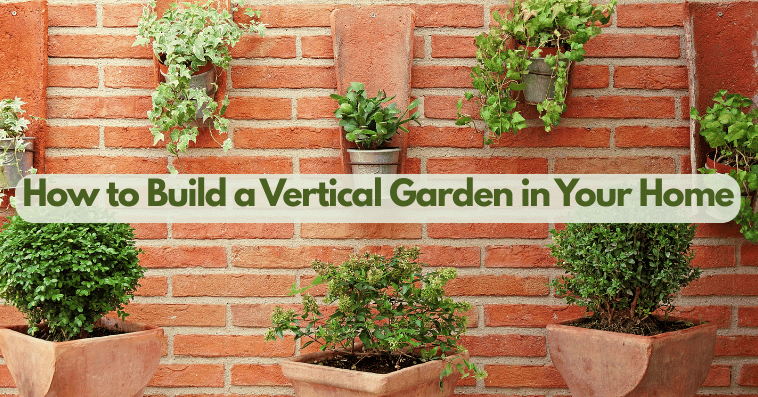As urban spaces shrink and sustainability becomes a priority, vertical gardens are emerging as a practical, stylish, and eco-friendly way to bring nature indoors. Whether you live in a compact apartment or have a spacious balcony, learning how to build a vertical garden at home can transform any dull wall into a vibrant green oasis.
In this comprehensive guide, we’ll show you step-by-step how to set up a vertical garden, the best plants to grow, tips for maintenance, and where to buy all the materials you need. Let’s dig in!
What is a Vertical Garden?
A vertical garden, also known as a living wall or green wall, is a system where plants grow upward using vertical space rather than spreading across the ground. It’s an excellent solution for urban gardening, balcony gardening, or anyone short on space but rich in plant love.
Whether mounted on a wall, placed in hanging pockets, or built using repurposed shelves or pallets, vertical gardens not only add greenery but also purify air, reduce noise, and insulate your home naturally.
Benefits of a Vertical Garden at Home
✅ Space-efficient gardening in apartments or small balconies
✅ Improves air quality and promotes a healthier indoor environment
✅ Adds a natural aesthetic appeal to your home decor
✅ Acts as a natural insulator and reduces indoor temperatures
✅ Reduces stress and increases mindfulness
What You’ll Need to Start a Vertical Garden
Before you get your hands dirty, gather these essentials:
- Vertical frame or structure (e.g., wooden pallet, wall-mounted frame, tiered shelf, trellis)
- Planters or planting pockets
- Potting mix or vertical garden soil
- Drip irrigation system or watering cans
- Waterproof backing (to protect walls indoors)
- Indoor or outdoor plants
- Fertilizer and gardening tools
💡 You can find many of these items in DIY kits or vertical gardening sets on online platforms like PaudheWale.
Step-by-Step: How to Build a Vertical Garden at Home
Step 1: Choose the Right Location
Your vertical garden’s location determines which plants will thrive. Consider:
- Sunlight exposure: South-facing balconies or walls get more sunlight.
- Air circulation: Essential for plant health and avoiding fungal growth.
- Water access: Proximity to a tap makes maintenance easier.
👉 For indoor vertical gardens, choose areas near windows with bright, indirect light.
Step 2: Pick Your Vertical Garden Structure
Depending on your budget and creativity, choose a structure that fits your space:
- Wall planters: Ideal for modern homes with sturdy walls.
- Wooden pallets: Upcycle old ones for a rustic, budget-friendly option.
- Hanging pots or baskets: Perfect for balconies.
- PVC pipe gardens: A DIY trend for those who enjoy crafting.
- Readymade vertical garden kits: Available online for hassle-free setup.
Step 3: Install Waterproofing (For Indoor Gardens)
If you’re setting up your garden indoors or on a painted wall, use a plastic or PVC backing sheet to prevent moisture damage.
Step 4: Add Soil and Planters
Use lightweight, well-draining soil enriched with compost or cocopeat. Add a layer of pebbles at the bottom of containers to improve drainage and prevent waterlogging.
You can use:
- Geo-fabric grow bags
- Plastic planters
- Terracotta pots
- Upcycled containers
Step 5: Choose the Right Plants
The best vertical garden plants are those with shallow roots, low maintenance needs, and adaptable growth. Here are some popular options:
🌿 For Indoor Vertical Gardens:
- Snake Plant
- Money Plant (Pothos)
- Ferns
- Spider Plant
- Syngonium
- Philodendron
🌸 For Outdoor Vertical Gardens:
- Petunia
- Marigold
- Portulaca
- Basil
- Mint
- Strawberry
Mix and match plants with different colors, sizes, and textures to create a beautiful wall of green.
Step 6: Set Up an Irrigation System
Manual watering can be time-consuming, especially for large green walls. A drip irrigation system is ideal as it delivers water directly to each plant’s roots.
For smaller vertical gardens, you can:
- Use a watering can with a long spout
- Install a drip tray to catch excess water
- Water in the morning to avoid fungal growth
Step 7: Maintain Your Vertical Garden
Regular maintenance ensures your vertical garden remains lush and healthy:
- Prune dead leaves and stems to encourage new growth
- Fertilize once a month with a balanced liquid fertilizer
- Check for pests like aphids or mealybugs, especially in humid conditions
- Rotate plants occasionally for even light exposure
- Clean pots and containers to prevent algae buildup
Vertical Garden Design Ideas for Your Home
Looking for inspiration? Try these:
- 🌿 Kitchen herb wall: Basil, mint, thyme, and coriander in hanging pots
- 🌱 Bathroom vertical garden: Moisture-loving ferns and pothos
- 🧱 Balcony green wall: Mix of flowering and foliage plants on wooden frames
- 💡 Indoor wall art: Frame your vertical garden as a living painting
Things to Keep in Mind
- Not all walls can handle the weight of a vertical garden. Use lightweight planters or get professional installation help.
- Vertical gardens dry out faster than traditional ones — check moisture levels often.
- Regularly clean and inspect your setup to prevent wall damage or leaks.
Why You Should Start a Vertical Garden Today
If you’re someone who:
- Has limited space but loves plants
- Wants to reduce indoor heat and improve air quality
- Craves a natural touch in your home decor
- Enjoys low-maintenance gardening
Then a vertical garden is exactly what you need.
Where to Buy Vertical Garden Kits and Plants Online
Ready to build your own vertical garden?
🌿 Head over to PaudheWale to explore a wide range of vertical garden kits, planters, flowering plants, indoor greens, and tools. PaudheWale offers top-quality plants, budget-friendly pricing, and reliable home delivery — everything a gardener needs in one place.
Transform your walls into thriving green spaces — one plant at a time.
Build your vertical garden today with PaudheWale!

